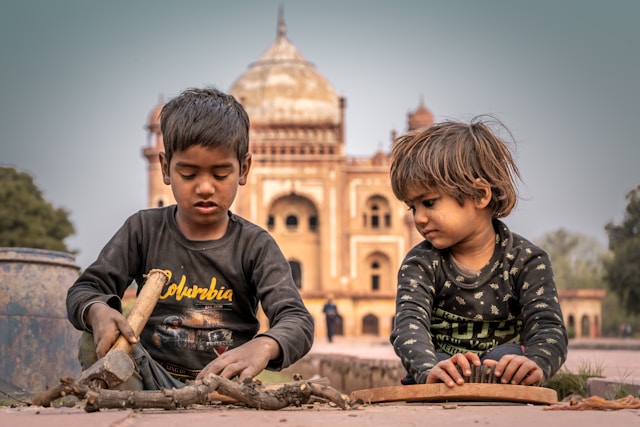Securing international funding can significantly enhance the ability of Indian NGOs to expand their programs and sustain long-term social impact. While Corporate Social Responsibility (CSR) funds and government grants are essential financial sources, international donors provide larger funding pools for projects focusing on education, healthcare, environmental sustainability, human rights, gender equality, and rural development.
This article explores key international funding sources, eligibility requirements, and the step-by-step application process to help NGOs secure global financial support.
Why International Funding Matters for NGOs in India
Diversified Revenue Streams - International funding reduces an NGO’s reliance on local corporate CSR funding and domestic government grants. Having multiple funding sources ensures financial stability and long-term project sustainability.
Larger Funding Pool - International donors often provide grants ranging from $50,000 to multi-million-dollar projects, offering greater scope for expansion and impact.
Access to Global Expertise and Networks - Securing international funding not only provides financial support but also connects NGOs with global networks, increasing credibility, learning opportunities, and partnerships with other social organizations worldwide.
Higher Accountability and Transparency Standards - International grants often require NGOs to adhere to strict governance, compliance, and impact assessment norms, which can improve operational efficiency and credibility in the long run.
Major International Funding Sources for Indian NGOs
1. United Nations (UN) Agencies
The UN provides various funding opportunities through specialized agencies:
- UNICEF (United Nations International Children's Emergency Fund): Focuses on education, child health, and nutrition programs.
- UNDP (United Nations Development Programme): Grants for poverty reduction, sustainable development, and governance projects.
- WHO (World Health Organization): Provides funding for public health initiatives.
- UNESCO (United Nations Educational, Scientific and Cultural Organization) – Grants for education, cultural preservation, and human rights programs.
2. The Bill & Melinda Gates Foundation: The Gates Foundation supports global development initiatives, particularly in healthcare, sanitation, agriculture, and poverty alleviation.
3. The Ford Foundation: The Ford Foundation provides funding for social justice, democracy, human rights, and economic development programs.
4. Global Fund for Women: Global Fund for Women is a major donor supporting gender equality, women’s rights, and female entrepreneurship projects.
5. MacArthur Foundation: MacArthur Foundation funds initiatives related to climate change, policy reforms, and social justice.
6. Oak Foundation: Oak Foundation provides funding for human rights, environmental conservation, and child protection programs.
7. European Union (EU) Grants: The European Union Grants Portal offers funding for NGOs engaged in governance, human rights, climate action, and social development programs.
International Crowdfunding Platforms
Some NGOs also raise funds through crowdfunding platforms such as:
- GlobalGiving: Supports NGOs worldwide by connecting them with donors.
- GoFundMe: Allows NGOs to raise funds for social causes.
- Milaap, Ketto, and ImpactGuru: Indian platforms that allow international donations.
Eligibility Criteria for International Grants
Legal Registration and Compliance
- NGOs must be legally registered under:
- The Societies Registration Act, 1860
- The Indian Trusts Act, 1882
- Section 8 of the Companies Act, 2013
- NGOs must obtain FCRA (Foreign Contribution Regulation Act) registration, which is mandatory to receive foreign grants in India.
Operational Experience and Credibility
- Most international donors prefer NGOs with at least three to five years of proven experience in their respective sectors.
- NGOs must have a track record of successfully executing similar projects, along with case studies, testimonials, and impact assessment reports.
Financial Transparency
- NGOs must maintain audited financial statements and submit tax exemption certifications (12A & 80G).
- Many donors require detailed financial reports and proper fund utilization plans to ensure accountability and transparency.
Alignment with Donor’s Mission and Objectives
- NGOs must carefully study the funding organization’s mission, focus areas, and past funding projects to ensure alignment.
- Proposals must clearly outline how the NGO’s objectives contribute to the donor’s goals.
How to Apply for International Grants
Step 1: Identify Suitable Grant Programs
- Research global donors who fund NGOs in your sector.
- Subscribe to websites like FundsforNGOs, GrantStation, and Devex to stay updated on new grant opportunities.
Step 2: Understand the Grant Guidelines
- Review eligibility criteria, application deadlines, and required documentation.
- Check the minimum and maximum funding amounts available.
Step 3: Develop a Strong Grant Proposal
A compelling grant proposal should include:
- Problem Statement – Clearly describe the issue your NGO aims to address.
- Project Goals & Objectives – Define expected outcomes and impact.
- Implementation Plan – Provide a timeline, project activities, and execution strategy.
- Budget Plan – Break down expenses and explain fund utilization.
- Impact Assessment: Detail the expected number of beneficiaries and KPIs for measuring success.
- Organizational Capability: Showcase past achievements, case studies, and previous donor collaborations.
Step 4: Register on International Grant Portals
- Many funding organizations require NGOs to submit proposals online through portals such as:
- UN Partner Portal
- USAID Grants Portal
- European Commission’s Funding Portal
- Ford Foundation Grant Application Portal
International grants offer long-term funding opportunities that enable Indian NGOs to expand their reach and impact. By identifying the right donors, crafting compelling proposals, and maintaining transparency, NGOs can increase their chances of securing international funding and driving sustainable social change.
Looking for more funding insights?
Explore our guides on CSR Grants, Government Grants, and Crowdfunding for NGOs to diversify your funding sources and achieve financial stability.







